
views
Preparing Your Home
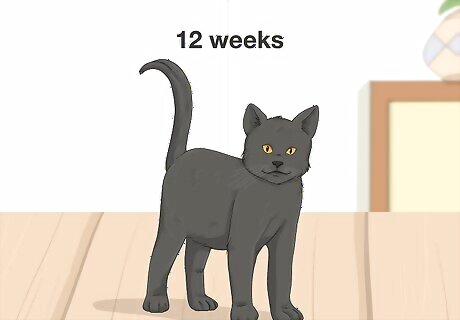
Wait until the kitten is old enough to leave its mother. Kittens should not leave their mother before 8 weeks of age. Indeed there is some debate about when is the right time, with some people arguing that 12 weeks is the correct age to go to a new home. However, at 12 weeks of age a kitten's ability to accept new experiences is slowing up, which means it can be harder for it to fit into a new home. Most kittens brought up from birth in loving homes and with plenty of food and love, are confident enough to leave their mothers after 8 weeks. This is a good compromise to allow the kitten to be socialized in their new home at the right age.
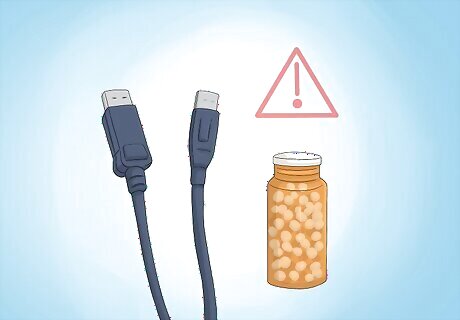
Prepare your home to create a safe space for your new pet. You need to kitten proof your home before the little one arrives. Put away all hazards that the kitten could get into. This includes cleaning supplies, medicines, and small items that you treasure and don't want broken. You should also keep cords, such as computer cords or cords on blinds, out of reach of the kitten. You may want to consider certain areas off limits to the kitten. If that is the case, you need to figure out a way to block off the areas so the kitten can't get in. Get rid of plants that are poisonous to cats. There are a wide variety of common house plants that can severely injure, or kill, a cat if it eats them. Research your plants to see if they cause a threat to your new family member.
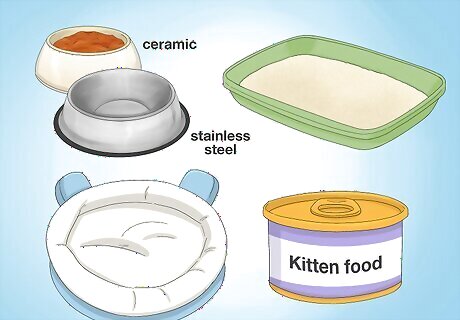
Buy supplies before you bring the kitten home. You will need to buy a variety of items in order to meet the needs of your new family member. These items include (but are not limited to): A litter box: A kitten's little legs require a low-sided tray so it can hop in without problems. You can always change to a deep-sided litter box once the kitten is older. Cat litter: Avoid clumping cat litter since kittens like to explore with their mouths and if it swallows clumping cat litter it can form a blockage in its gut. Food and water bowls: Ceramic or stainless steel are best, as these wash well and the surface doesn't scratch and harbour bacteria like plastic bowls do. Kitten food: Start by feeding the same food the kitten was weaned onto. Ask whoever has been taking care of the cat for the brand of food and how much they have been giving it. Hiding places: The kitten will be anxious at first, so provide plenty of hiding places, such as cardboard boxes, where it can feel safe as it gathers its courage. Blankets or a soft bed: Soft bedding to snuggle into is important for the kitten. Try to bring the blanket or soft bed when you pick up the kitten, so that you can get some familiar smells on it from its mother and original home. Comb or brush: Groom your kitten from an early age so it doesn't mind being combed as an adult. This is especially important for long-haired cats.
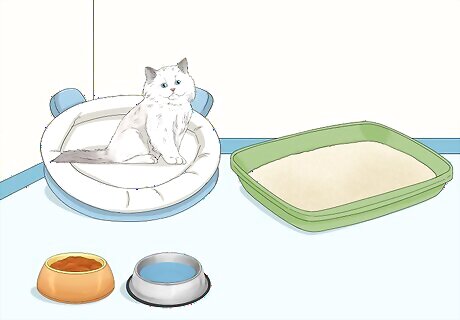
Set up a room for the kitten to be put in initially. This should contain its food, water, bedding, hiding places, and litter tray. Leave the kitten in peace to explore for a little while and find that the room is safe. Spend some time with the kitten in its room and sit on the floor. Let it come to you to explore. Speak gently and quietly, and if she rubs against you gently stroke her back. As the kitten gets to know where to find food, water, and its tray, and over the coming days as it becomes bolder, you can start leaving the room door open so it can slip out to explore.
Playing With a Kitten

Give the kitten toys. From 3 - 6 months old a kitten's job is to learn to hunt, because in the wild it would live by catching vermin and eating them. It is important to give the kitten an outlet for this behavior in play. Give it plenty of toys to stalk, chase, and pounce on. For example, kittens like small stuffed animal toys that they can carry around like prey. This not only teaches them the basics of hunting but also keeps them entertained. You can purchase cat toys but you don't have to spend money to make toys. A scrunched up ball of paper, a small soft toy tied onto a length of string, empty cotton reels, and ping-pong balls in an empty bathtub all make fantastic toys.

Keep the kitten busy and avoid leaving it alone too often. Avoid letting the kitten get bored! Keep its interest in the toys by rotating the toys it has available, rather than leaving them all out all the time. Put some away, so that when it sees them it's like having a new toy all over.
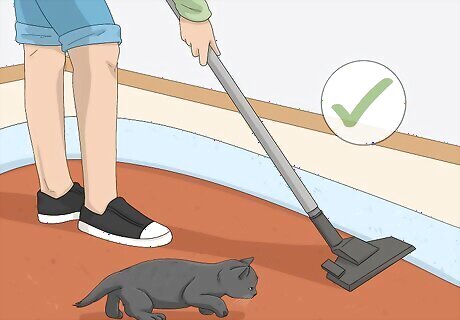
Expose the kitten to a variety of sounds and experiences. Have friends come over too meet the kitten. Play music on the stereo, run the vacuum, and let it see running water in the bath. These will help your kitten to understand, and enjoy instead of being afraid of, the variety of things that will happen in its life.
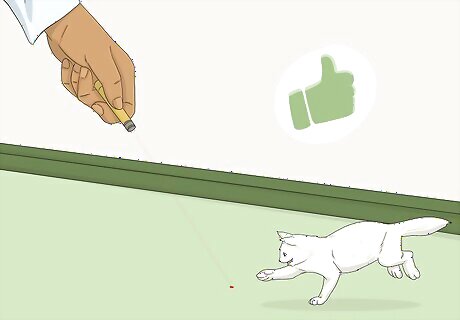
Play with your kitten as often as you can. Engage in play sessions by flicking a ball for it to chase, directing a laser pointer, and playing with a wing-on-a-string. This gives the kitten an outlet for its energy and helps it to bond with you.
Feeding a Kitten
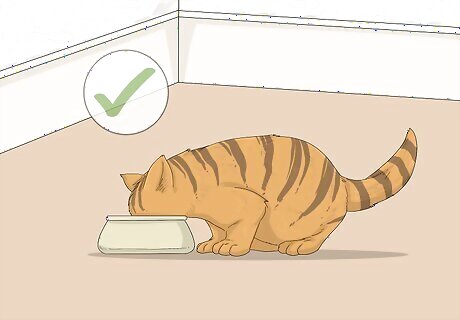
Feed the kitten the food it was eating before you brought it home. When you bring it home, feed what it is used to eating at her previous home. A sudden change of diet will upset its tummy. Decide what you want to feed the kitten long term. After 2 - 3 days, when it is settled, you can gradually change its diet. Do this by mixing in increasing quantities of the new food over several days so that the kitten's stomach gets a chance to adjust to the new food.
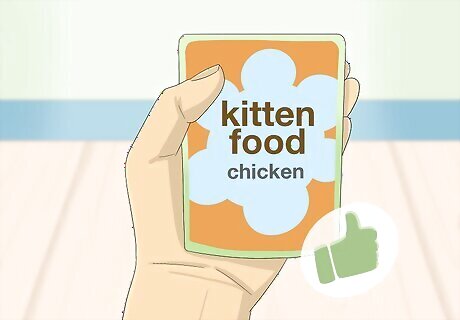
Choose a food labelled as "Kitten" or "growth." This food is balanced to provide the calcium and extra protein that a growing kitten needs. Choose a good quality food that has a named meat, for example "chicken" rather than "meat meal" or "chicken meal", as top ingredient on the label. Know that cats are obligate carnivores, which means they depend on meat to be healthy. This means that you need to avoid foods that are heavily bulked up with cereals. You can spot this by seeing if cereals or soy products are high on the food label.
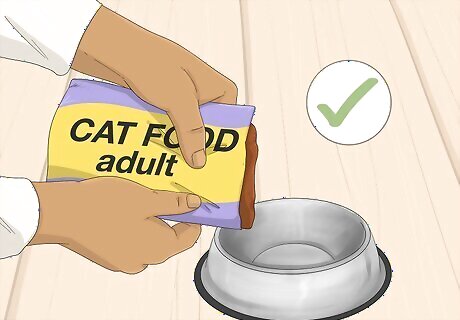
Adjust the type of food you give your kitten as it grows up. Your kitten needs a growth food during their first six months. After that, their growth slows down. Kitten foods are calorie dense, so if kitty is putting on too much weight, it is fine to switch to an adult food (less calories) at six months of age. If your kitty is at a correct weight switch to adult food at one year of age.
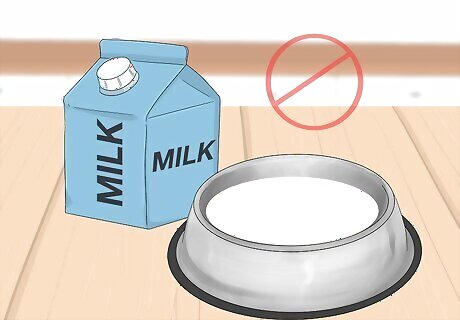
Avoid giving your kitten additional food. For example, don't give milk or cream. The kitten doesn't need it and it is likely to upset its stomach.
Caring For a Kitten's Health
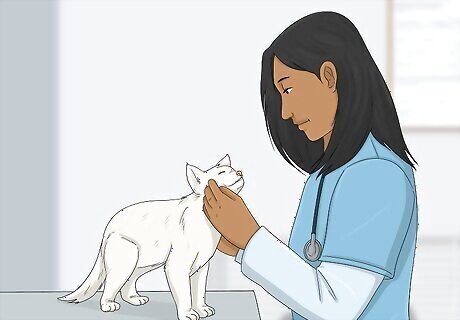
Take your kitten to its veterinarian within a week of getting it. This will help to socialize your kitten to the vet's office and allow you to ask any questions you have early on. It will also set a baseline for your kitten's health, as well as identifying any problems that need to be addressed.
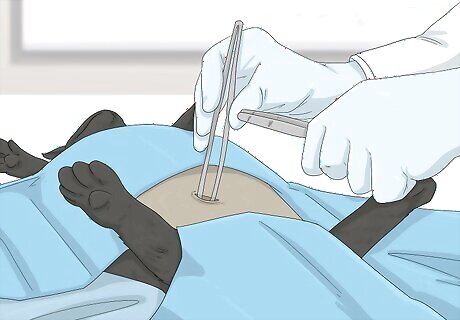
Get your kitten fixed. Desexing is important, as it reduces the cat's urge to spray or territory mark. It also reduces the urge to escape and wander in order to find a mate. Your veterinarian will discuss the best age for surgery for your kitten. Early neutering can be done from 12 weeks of age and should be done by 5 - 6 months at the latest.
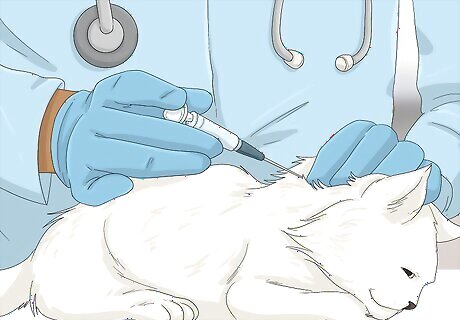
Get your kitten vaccinated. Your first routine visit to the vet should be around 9 weeks of age for its first vaccination. The vet will advise about the disease risks in your area and what vaccinations are advisable. A typical "core," or essential, vaccination is against feline distemper. This is a tough virus that you can walk in on your shoes, so even if kitty is an indoor cat they are still at risk. Feline leukemia requires close contact with other cats, so if your kitten lives indoors, the risk is much lower and this vaccine may not be necessary. Depending on which state you live in, rabies vaccination may be compulsory. This is usually given from 12 weeks of age.
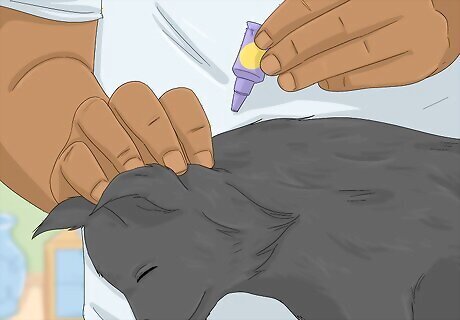
Get your kitten dewormed and eliminate fleas. Worming is advisable to get rid of any worms passed from mother to kitten. Worming protocols vary depending on which products are used. The easiest method is to use a product which kills fleas and worms, such as Stronghold (UK) / Revolution (US), which is applied to the skin on the back of the neck once a month.
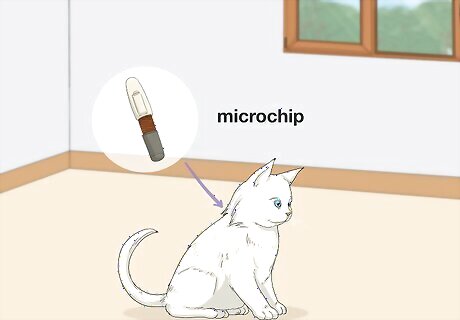
Consider having your kitten microchipped. A microchip is implanted beneath the skin of the scruff by your veterinarian. This transmits a unique number which is registered with a database that holds your contact details. Should the cat escape and be handed in at a shelter, or should the cat be stolen, the chip provides proof of ownership.




















Comments
0 comment